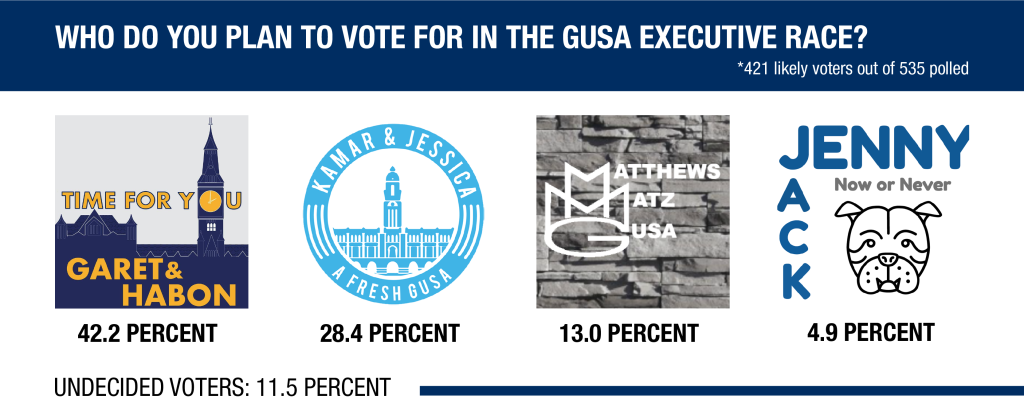
Garet Williams (COL ’18) and Habon Ali (SFS ’18) lead a tight Georgetown University Student Association executive race with the support of 42.2 percent of likely voters, according to a door-to-door poll of 535 students conducted by The Hoya on Tuesday night.
The Williams-Ali ticket is followed by Kamar Mack (COL ’19) and Jessica Andino (COL ’18) with 28.4 percent of likely voters, John Matthews (COL ’18) and Nick Matz (COL ’18) with 13.0 percent of likely voters and Jenny Franke (COL ’18) and Jack McGuire (COL ’18) with 4.9 percent of likely voters.
With two days left before election day, 11.5 percent of likely voters remain undecided.
The poll also shows potentially record high voter turnout for a GUSA executive race, with 58.1 percent of respondents saying they plan to vote for one of the candidates in the election. About 35 percent of the student body – 2,338 students – participated in last year’s executive election, while 54.5 percent of the student body – 3,637 students – participated in the 2015 executive election.
Although the majority of students said they plan on voting, 27.3 percent of respondents said GUSA is “not at all” relevant to campus life. About 65 percent of respondents said GUSA is “somewhat” relevant to campus life, while 8 percent said GUSA is “very” relevant to campus life.
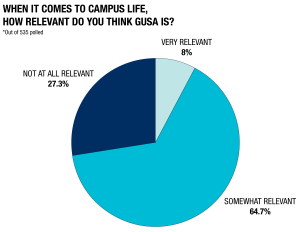
About 25 percent of respondents said they approve of the job being done by current GUSA President Enushe Khan (MSB ’17) and Vice President Chris Fisk (COL ’17), compared to 3.6 percent who disapprove. The overwhelming majority, about 72 percent, said they were indifferent or not sure.
The Khan-Fisk administration received lower ratings for both approval and disapproval than did the previous administration, which garnered 35.2 percent approval and 5 percent disapproval. By a 13-point margin, more respondents said they were indifferent or unsure compared to the previous administration led by Joe Luther (COL ’16) and Connor Rohan (COL ’16).
Khan said the numbers are a reflection of her and Fisk’s communication strategy this year, rather than the policies they have pursued.
“Seeing the ‘indifference’ and the ‘unsure’ really is more so a reflection of communications this year, and I think that if you were to ask us to reflect on something we didn’t do as well as we would have liked to, I would say is our communication strategy with GUSA this year,” Khan said.
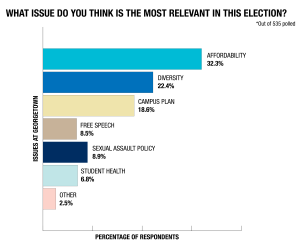
About 33 percent of likely voters cited affordability as the most relevant topic of the race over other issues. Affordability was the focal point of Monday evening’s presidential debate, during which the three participating tickets offered solutions to make a Georgetown education more affordable. The Mack-Andino, Matthews-Matz and Williams-Ali tickets also named affordability as the most pressing issue facing Georgetown in viewpoints published in The Hoya yesterday.
However, none of the candidates received majority support from likely voters who considered affordability to be the most relevant topic. These voters were split roughly evenly between the two leading tickets, with 30.9 percent of respondents selecting the Williams-Ali ticket, 28.2 percent selecting the Mack-Andino ticket and 16.3 percent selecting the Matthews-Matz ticket, which made affordability the centerpiece of its 10-point platform.
About 22 percent of respondents marked diversity and inclusivity as the most relevant topic, and about 19 percent listed campus planning as the most relevant.
The Williams-Ali ticket dominated among likely voters deeming diversity the most relevant topic, with 60.9 percent of these voters saying they intend to vote for Williams, compared to 27.5 percent for Mack.
About 9 percent of students selected sexual assault policy reform, which has featured heavily in campus discourse since the release of the results of the university’s first ever sexual assault and misconduct climate survey in July. About 7 percent of students listed student health as the most relevant topic, which all three tickets discussed at length in Monday evening’s debate.
Williams and Ali lead among both respondents who voted in last year’s executive election and those who did not, with about 50 percent of respondents who voted last year saying they plan to vote for the pair and 25.8 percent who did not vote last year planning to vote for the pair. About 15 percent of likely voters who did not vote last year said they plan to vote for Matthews-Matz, which has been seeking to earn the votes of those who do not typically vote in GUSA elections.
From the polling data, it is still unclear whether any ticket will be able to garner a majority of votes in the first round of voting. If no ticket wins a majority, the instant runoff system will take into account voters’ second and third choices, ultimately selecting the ticket that is preferred most strongly by the most voters.
The Mack-Andino and Matthews-Matz campaigns cross-endorsed each other at Monday’s debate, increasing the chances that one of them will win in a close runoff against Williams and Ali.
Williams said he is excited about the polling results, but isn’t assuming a win.
“We’re absolutely really excited about that, of course. But it’s important to note that we’re not taking any vote for granted right now. If this past November taught us anything, it’s that it’s not over until it’s over,” Williams said.
In a breakdown by gender, the Williams-Ali ticket leads among female voters, with 50.9 of female respondents stating that they plan to vote for the ticket. About 23 percent of female respondents said they plan to vote for Mack-Andino, 6.4 percent said they plan to vote for Franke-McGuire and 4.6 percent said they plan to vote for Matthews-Matz. About 15 percent of female respondents are undecided.
The breakdowns show a much narrower margin among males: About 29.3 percent of male respondents said they plan to vote for Mack, while 27.9 percent selected Williams. About 22 percent of male respondents said they intend to vote for Matthews-Matz and 2.7 percent said they plan to vote for Franke-McGuire. About 17 percent of male respondents are undecided.
Williams and Ali also held a dominant lead among LGBTQ respondents. Of the 20 LGBTQ respondents, 15 said they intended to vote for Williams compared to the three who chose Mack and the two still undecided. During the campaign, Williams has emphasized his experience as an advocate for LGBTQ issues.
Support for Mack was highest among African-American voters, who selected him over Williams by a margin of 54.5 percent to 40.9 percent.
Mack said he remains hopeful for election day after seeing the polling data.
“We’re still very hopeful, and we still feel very good about Thursday. We have expansive outreach plan; we’re going to be really bringing out the vote from our base. And also, the margin right now is not very big, and there are a lot of undecided voters out there,” Mack said. “We’re going to be having a lot of conversations between now and the end of voting, and we’re going to be trying our hardest to get those people who haven’t decided yet.”
Matz said his campaign is optimistic about election day, especially given the GUSA-outsider nature of his and Matthews’ ticket.
“I’m very happy with those numbers. We’re looking to attract a lot of nontraditional voters, and given the lengthy nature of the poll, I think that undoubtedly turned some of our potential voters away. Furthermore, our ticket appeals to a lot of students living off campus who probably weren’t polled,” Matz said. “So given that, I’m really happy with the result and I think we have a great chance.”
Election day is Thursday, Feb. 23.
Hoya Staff Writer Yasmine Salam contributed reporting.








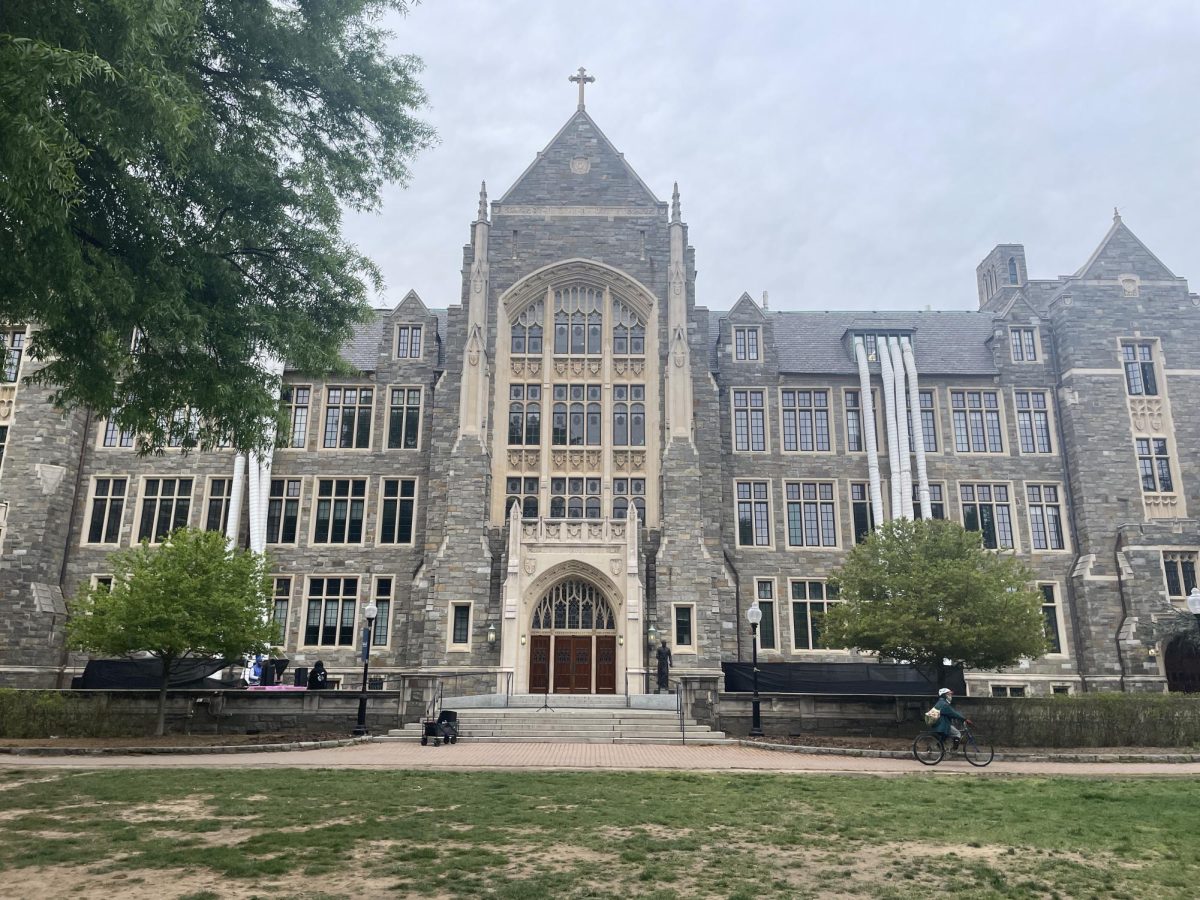

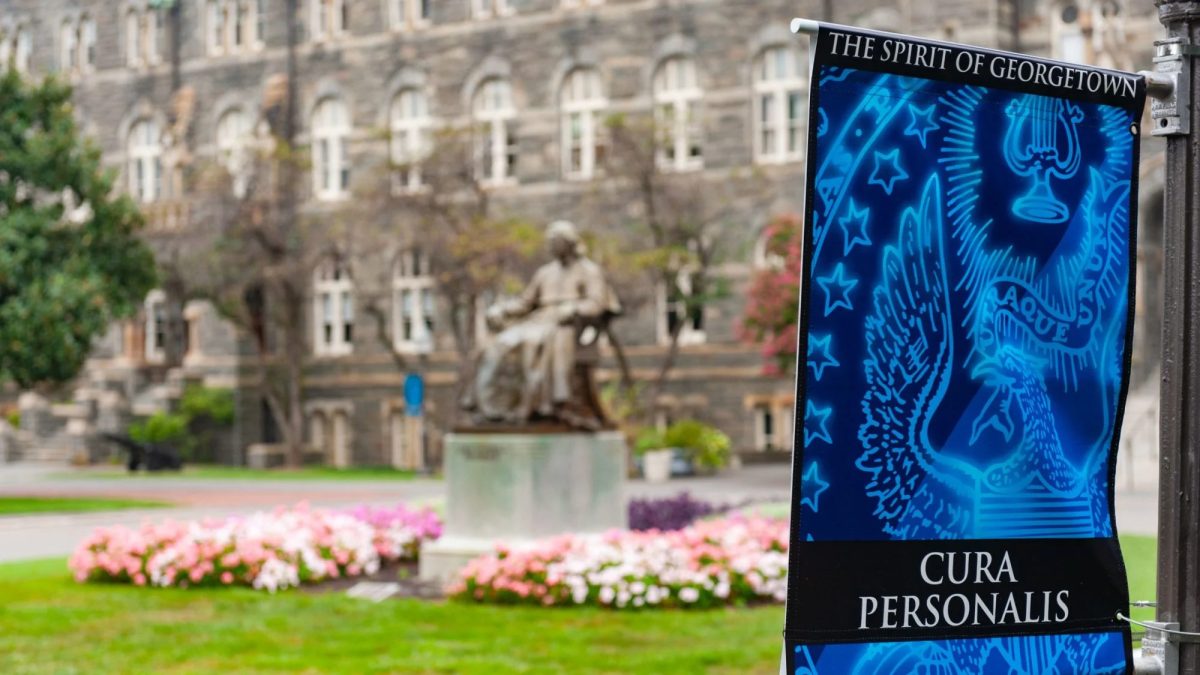
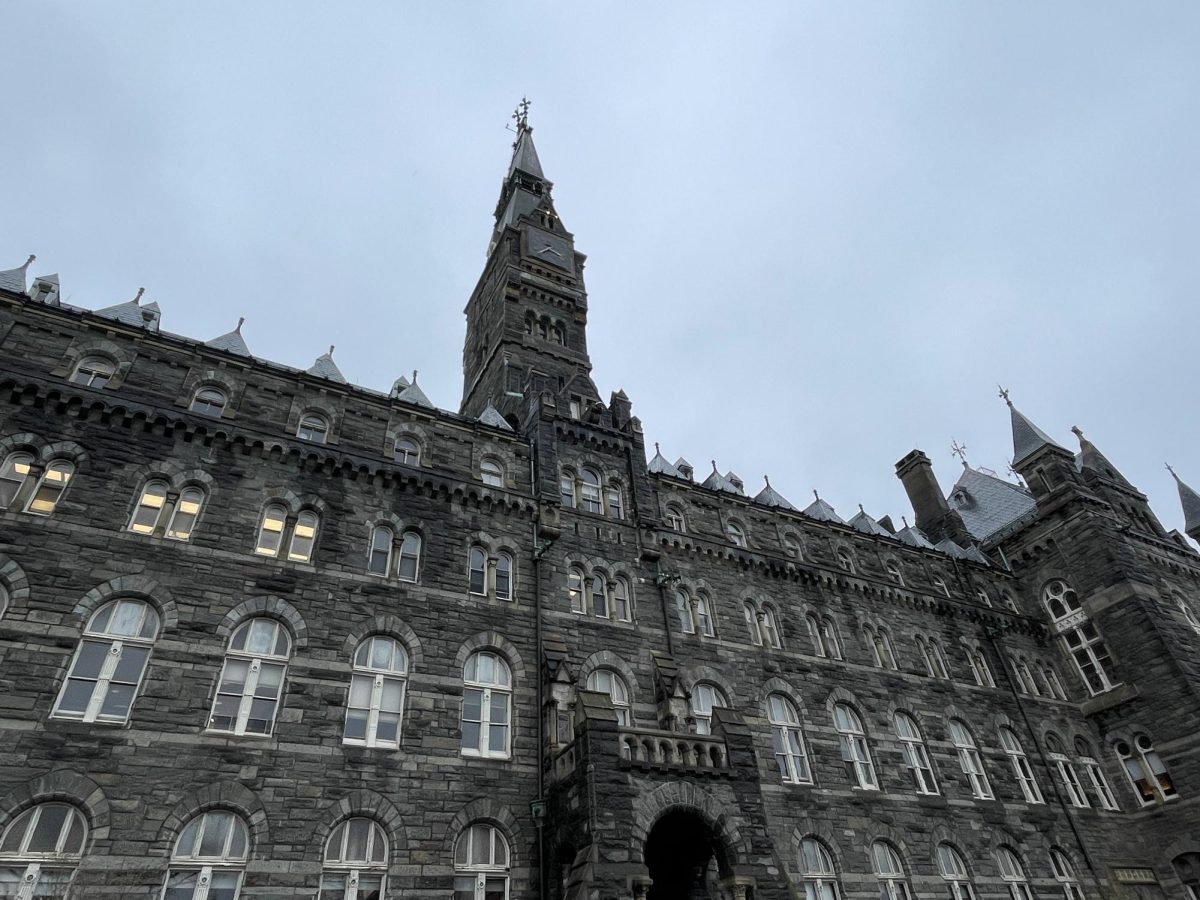







Recent Alum • Feb 22, 2017 at 5:33 pm
Very ambitious and sounds like an awesome project fielding this survey, but I’m skeptical of your polling methodology. Going door-to-door would lead to a pretty skewed, unrepresentative sample. You might have been better off using Google Apps’ survey software and restrict respondents to the Georgetown network.
I also think you guys would have been well served weighting the poll by past voter participation levels in each class. It might be a little more advanced statistically, but you would have avoided the clear red flag in your reporting that there’s somehow potentially record high voter participation this year, just one year after remarkably low turnout. 72% not sure on an executive approval rating is a clear sign that students don’t know anything about GUSA and that the executives are irrelevant. That is to say, signs don’t necessarily point to record high turnout. In fact, you might say the 28% who actually gave a response there are the only ones you can rely on to turnout.
Just my two cents, and again, seems like an awesome, innovative project, so I hope you guys thoroughly evaluate post-election and see where you can improve.